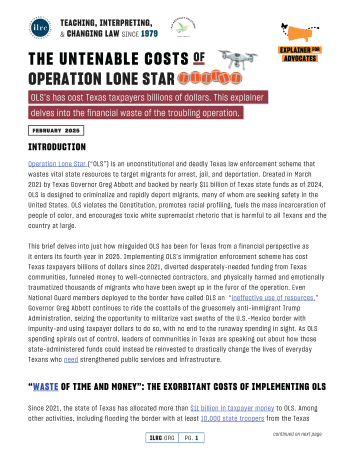
Operation Lone Star (OLS) is an unconstitutional and deadly Texas law enforcement scheme that wastes vital state resources to target migrants for arrest, jail, and deportation. To date, nearly $11 billion has been spent on OLS. This policy brief delves into how misguided OLS has been for Texans from a financial perspective and provides recommendations for how OLS funds could be reinvested to support the everyday lives of Texans who need strengthened public services and infrastructure.
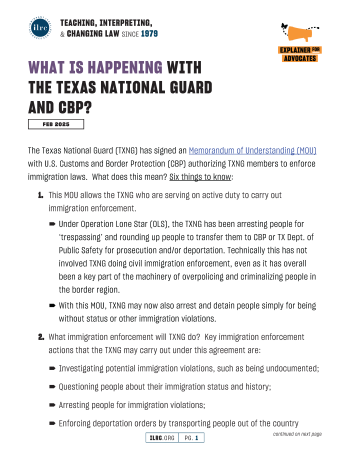
CBP has signed an agreement delegating immigration enforcement authority to the Texas National Guard. Under the President's "mass influx" declaration, local and state law enforcement agencies may take on civil immigration enforcement authority that they wouldn't otherwise have. These specific powers are designated in a Memorandum of Understanding signed with CBP. This quick explainer highlights what this MOU says, what this means for Texas, and how it relates to Operation Lone Star.
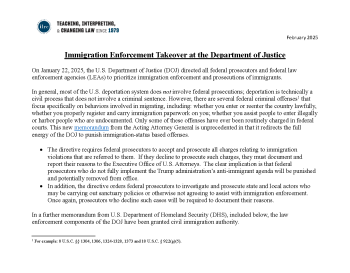
Following the new administration’s dramatic reorientation of all federal agencies into immigration enforcers, on January 21st, 2025, the DOJ issued a directive requiring all federal prosecutors to prioritize immigration prosecutions. The memorandum also threatens prosecutions and civil lawsuits to sanctuary jurisdictions and entities that seek to protect immigrants. In this analysis, we explain the different sections of the DOJ’s memo and what they mean for immigrants and federal courts nationwide.
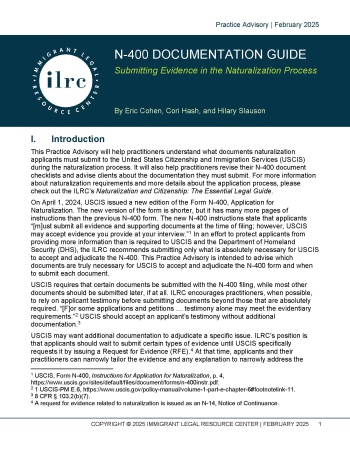
In 2024, USCIS issued a new Form N-400, Application for Naturalization, with more lengthy and complicated instructions on evidence that could be included. This guide will help practitioners understand what documents naturalization applicants must submit to the USCIS to accept and adjudicate the N-400 form and when to submit each document.
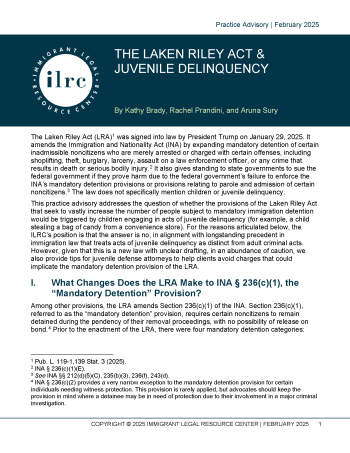
The Laken Riley Act (LRA) was signed into law by President Trump on January 29, 2025. It amends the Immigration and Nationality Act (INA) by expanding mandatory detention of certain inadmissible noncitizens who are merely arrested or charged with certain offenses. This practice advisory addresses the question of whether the provisions of the LRA that seek to vastly increase the number of people subject to mandatory immigration detention would be triggered by children engaging in acts of juvenile delinquency. In the advisory, we argue that the answer is no, in alignment with longstanding precedent in immigration law that treats acts of juvenile delinquency as distinct from adult criminal acts. However, given that this is a new law with unclear drafting, we also provide tips for juvenile defense attorneys to help clients avoid charges that could implicate the mandatory detention provision of the LRA.
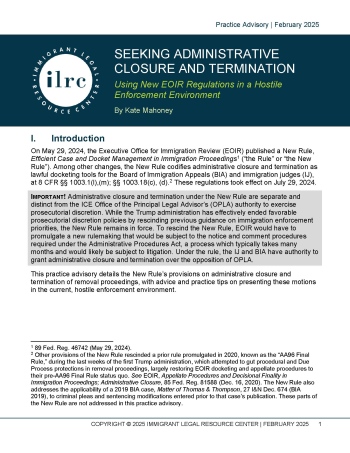
New EOIR regulations published in 2024 now allow immigration judges and the BIA to administratively close or terminate removal proceedings in a variety of scenarios. These regulations permit—and sometimes require—administrative closure or termination even where the Department of Homeland Security does not agree. In the current hostile enforcement environment, and in light of the rescission of formal guidance regarding prosecutorial discretion, these regulations are an important tool for advocates seeking to get clients out of removal proceedings.

Since Donald Trump was re-elected, headlines on immigration have sounded the alarm about his administration’s plans to effectuate mass deportations, increased detentions, and indiscriminate raids. For the past three years, Governor Greg Abbott has used Texas as a laboratory for these types of policies through Operation Lone Star (OLS). This resource aims to parallel the national moves on enforcement to what has already taken place in Texas, in hopes to better equip community members and advocates with the framework to fight back.
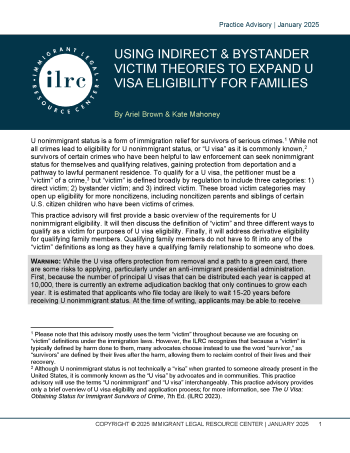
Eligibility for U Nonimmigrant Status, commonly known as the “U Visa,” hinges on whether the applicant has been the “victim” of a qualifying crime. The regulations implementing the U visa statute contemplate three categories of “victims” who may qualify for the U visa: direct, bystander, and indirect victims. This practice advisory provides a basic overview of the requirements for U nonimmigrant eligibility. It then discusses the definition of “victim” and three different ways to qualify as a victim for purposes of U visa eligibility. Finally, it addresses derivative eligibility for qualifying family members.
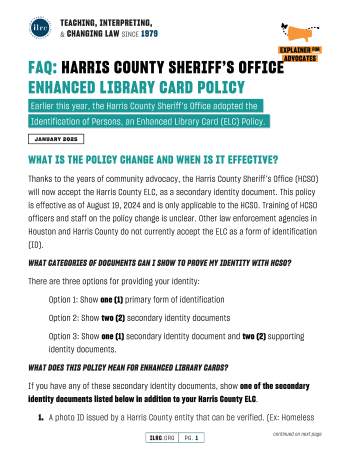
Thanks to the years of community advocacy, the Harris County Sheriff’s Office (HCSO) will now accept the Harris County ELC, as a secondary identity document. This policy is effective as of August 19, 2024 and is only applicable to the HCSO. Training of HCSO officers and staff on the policy change is unclear. Other law enforcement agencies in Houston and Harris County do not currently accept the ELC as a form of identification (ID).